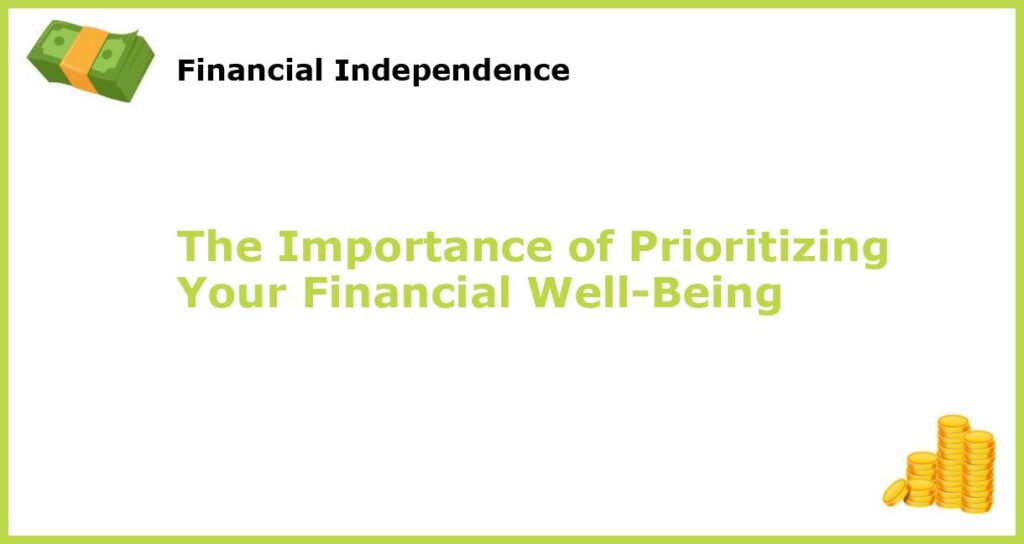Money makes the world go round, or so they say. While it may not be the most important thing in the world, financial stability and well-being are crucial to living a happy and healthy life. Prioritizing your finances may not always seem like the most exciting thing to do, but the benefits are undeniable. In this article, we’ll discuss the top reasons why you should prioritize your financial well-being, and offer some tips on how to get started.
The Benefits of Financial Stability

Financial stability goes far beyond just having enough money to pay your bills on time. It means having a solid foundation for your future financial goals, a plan in place for unexpected expenses, and peace of mind that you’re in control of your finances. Studies have shown that financial stability can have a significant positive impact on your mental and physical health. This is because the stress of financial instability can lead to a range of health problems, such as high blood pressure, heart disease, and anxiety disorders. By prioritizing your financial well-being, you can improve your overall health and well-being.
The Importance of Setting Financial Goals

If you don’t know where you’re going, it’s hard to know when you’ve arrived. Setting specific financial goals can give you a road map to follow and drive your financial decisions. Whether you’re saving for retirement, paying off debt, or building an emergency fund, having clear goals in mind can help you stay motivated and on track. Without a sense of direction, it can be easy to overspend or fall into bad financial habits. By setting realistic, achievable goals, you can take control of your finances and make steady progress towards financial security.
The Dangers of Consumer Debt

Consumer debt, such as credit card and personal loan debt, can be a major obstacle to financial stability. High levels of debt can make it difficult to save for the future, pay bills on time, and lead to feelings of stress and overwhelm. It’s essential to prioritize paying off non-mortgage debt and working towards staying debt-free. By reducing your debt load, you’ll be able to put more money towards your financial goals and free up mental energy to focus on other areas of your life.
The Benefits of Saving Early and Often

One of the best ways to prioritize your financial well-being is to save early and often. Saving even small amounts regularly can add up over time and help ensure financial security in the future. Starting early means that you have time on your side, and compound interest can work its magic. By investing in your future selves, you can take advantage of the power of compound interest and watch your savings grow over time. The sooner you start saving, the easier it will be to reach your financial goals, and the less you’ll have to save in the long run.
The Importance of Financial Education

Financial education is essential for anyone who wants to prioritize their financial well-being. Knowing the basics of personal finance, such as budgeting, investing, and managing debt, can help make informed decisions and avoid costly mistakes. Educating yourself about money is an investment that can pay off for years to come. By developing a deep understanding of financial concepts, you can become confident in your financial decision-making and take control of your financial future.
The Impact of Inflation on Your Finances

Inflation can be a significant obstacle to financial well-being, especially when it comes to long-term savings such as retirement accounts. It’s important to understand the effects of inflation and adjust your savings plan accordingly. Investing in assets that outpace inflation, such as stocks, real estate, or precious metals, can help ensure your money retains its value over time. By staying informed about the latest inflation trends and making informed decisions, you can protect your financial future and ensure that your savings work for you.
The Role of Insurance in Financial Security

Insurance is an essential component of financial security. Whether it’s health insurance, life insurance, or disability insurance, having protection in place can help prevent financial disaster in the event of an unexpected event. While insurance premiums may seem expensive, the cost is minimal compared to the potential financial devastation that can occur without adequate coverage. By prioritizing insurance coverage, you can gain peace of mind and ensure that your family and assets are protected.
The Importance of Creating a Budget

Creating a budget is one of the most effective ways to prioritize your financial well-being. By tracking your income and expenses, you can gain a better understanding of where your money is going and identify areas where you can cut back. Budgeting helps you live within your means and avoid overspending, leading to better financial stability in the long run. When creating a budget, it’s important to be realistic about your income and expenses, and to set aside money for savings and unexpected expenses. By sticking to your budget, you can achieve your financial goals and manage your finances effectively.
The Impact of Lifestyle Inflation on Your Finances

The more money you make, the more money you spend – it’s a common trap that many people fall into. Lifestyle inflation, or the tendency to spend more as your income rises, can be a significant obstacle to financial well-being. It’s essential to resist the urge to upgrade your lifestyle every time you receive a raise or bonus, as this can quickly lead to overspending and prevent you from reaching your financial goals. Instead, prioritize saving and investing any additional income for long-term financial security. By keeping your lifestyle in check and living below your means, you’ll be able to achieve your financial goals faster.
The Benefits of Seeking Professional Financial Advice
While there is no shortage of financial advice available online, seeking professional advice can be beneficial for anyone who wants to prioritize their financial well-being. A financial advisor can help you create a personalized plan based on your unique financial situation and provide guidance and support along the way. An advisor can also help you navigate complex financial decisions, such as investing or estate planning. By enlisting the help of a professional, you can gain peace of mind and ensure that your financial decisions align with your goals and values.







